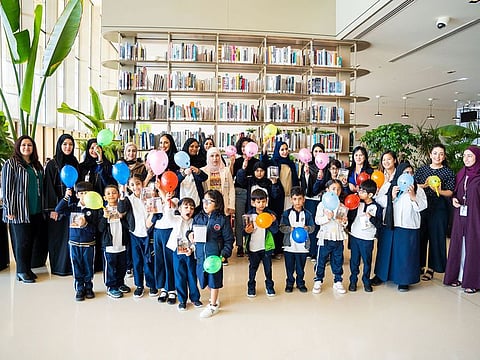How Braille has changed the lives of children in Sharjah
Kalimat Foundation, House of Wisdom, Emirates Schools Establishment celebrate a cause

Sharjah: Braille has given hope to the blind and visually-impaired, providing them with the ability to access and make the most of education and cultural communication, said Amna Al Mazmi, Manager of Kalimat Foundation (KF), emphasising the importance of collaboration between government, civil society organisations, and the public and private sectors to produce accessible books in all fields, ensuring that everyone has the right to education.
Al Mazmi also highlighted the role of braille in helping children with visual challenges feel connected to their communities and cultures. She stressed that the consequences of a lack of access to books in accessible formats will be a huge gap in their lives that can only be bridged through culture, education and concepts learnt and shared through those books.
Her comments were made during Kalimat Foundation’s celebration of World Braille Day, an annual event held on January 4 to raise awareness about the importance of braille. The Sharjah-based non-profit organisation hosted 25 children, including those with visual impairments, in collaboration with the House of Wisdom (HoW) and Emirates Schools Establishment (ESE).
The celebratory event included a reading session with Samya Ayish who captivated the youngsters with ‘Falfoosh Lost His Memory’, published by Kalimat, in imprint of Kalimat Group (KG). The session was followed by a workshop aimed at exemplifying the significance of braille and its role in empowering children with accessible sources of knowledge. The children learnt different reading and writing methods and techniques as well as the basics of braille characters that are formed in two columns, the first on the left, and the second on the right, using a combination of six raised dots arranged in a matrix called the braille cell, and how to form those cells and understand them.
The children were happy to engage in the fun-filled workshop which drew a smile on their faces while bolstering their self-confidence and sense of social responsibility as they helped each other to form the braille cells. At the end of the event, KF distributed a collection of accessible books to the participants, giving sighted children the opportunity to explore and learn content written in different accessible formats, and at the same time enabling blind and visually impaired youngsters to read and benefit from new meaningful content.
Through this celebration, KF aimed to raise awareness about education and culture among visually disabled children, as well as highlighting the importance of collaboration between civil society organisations to ensure the needs and basic rights of all social groups are met, especially those facing challenges in accessing knowledge. The celebration also called for an increase in the production and distribution of accessible books, the promotion of events, reading sessions, and workshops, as well as new methods and techniques for creating books in different accessible formats.
Since its founding, KF has worked to improve the lives of blind and visually impaired children through its ‘Ara’ (I see) initiative, which supports the production of accessible content in all formats. The organisation has been successful in raising awareness about the needs of print-disabled children in the MENA region and supporting their integration and inclusion.
Sign up for the Daily Briefing
Get the latest news and updates straight to your inbox


